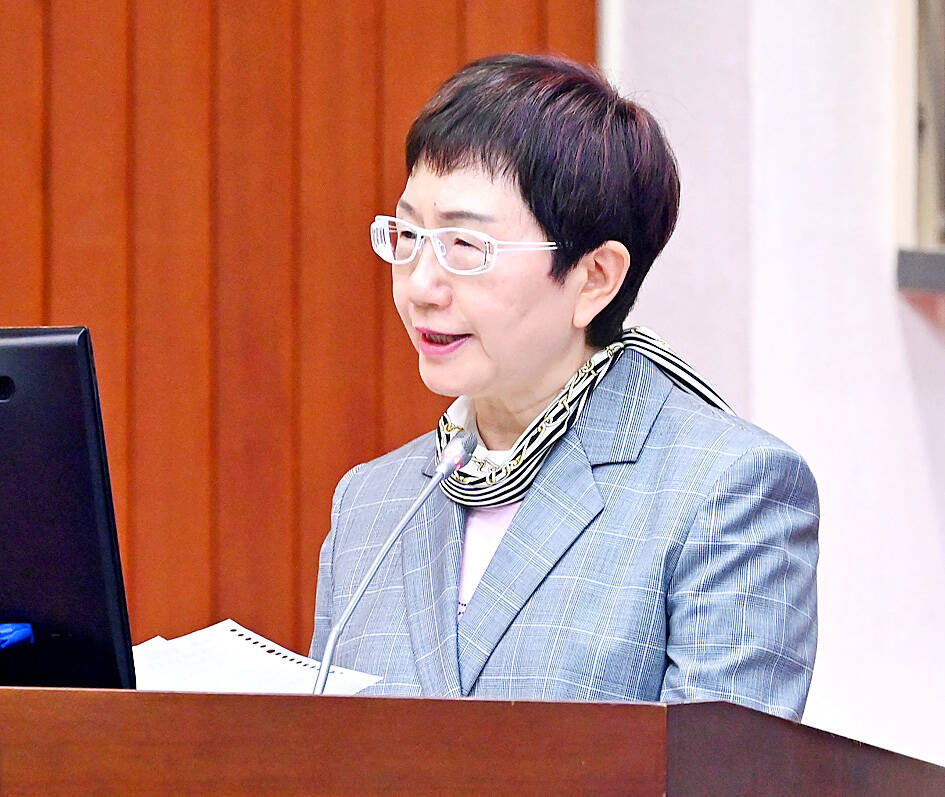The Ministry of Finance is open to discussions about lowering the business tax on the financial industry proposed by the Financial Supervisory Commission (FSC), Minister of Finance Chuang Tsui-yun (莊翠雲) said at a meeting of the legislature’s Finance Committee yesterday.
Taiwan raised the business tax rate on banks and insurance companies to 5 percent from 2 percent in 2014, with part of the tax revenue being allocated to a special reserve fund to buffer against potential risks or losses. From 2014 to last year, about NT$216.2 billion (US$6.71 billion at the current exchange rate) in business tax revenue had been allocated to the special reserve fund, ministry data showed.
As the relevant provisions are about to expire at the end of next year, FSC Chairman Thomas Huang (黃天牧) on Wednesday last week said he hoped to discuss with the finance ministry to return the business tax rate to at least the 2 percent level seen before 2014.

Photo: Chu Pei-hsiung, Taipei Times
Democratic Progressive Party (DPP) Legislator Michelle Lin (林楚茵) yesterday said a cut in the tax rate to 2 percent from 5 percent could help the financial industry save at least NT$25 billion to NT$30 billion a year and she asked what the finance ministry’s stance is.
In response, Chuang said her ministry would evaluate the pros and cons of the FSC proposal and submit a report within a month.
According to the ministry’s assessment, if the business tax rate is lowered to 2 percent and the tax revenue does not go into the reserve fund, but into the national coffers, it ends up contributing to the nation’s tax income, Chuang added.
Tax Administration Director-General Sung Hsiu-ling (宋秀玲) said she agreed that tax cuts would be positive for the financial industry overall, but what deserves further consideration is whether the reserve fund is sufficient should something go wrong.
The business tax for the financial industry in Taiwan covers four categories, with the rate set at 5 percent on banks and insurance companies, 2 percent on exclusive businesses other than banks and insurance firms, 1 percent on reinsurance premium income and 5 percent on other non-exclusive businesses.
Taiwan lowered the business tax rate on banks and insurance companies to 2 percent from 5 percent in 1999 following the Asian financial crisis and further cut it to zero in 2001 to support the local financial industry.
In 2005, the nation raised the rate to 2 percent to replenish the financial reconstruction fund, which was prevously established to clean up the bad loans of poorly run financial institutions, and in 2014 increased the rate to 5 percent, of which 2 percent went to the special reserve for the financial industry and 3 percent went to the national coffers.

UNCERTAINTY: Innolux activated a stringent supply chain management mechanism, as it did during the COVID-19 pandemic, to ensure optimal inventory levels for customers Flat-panel display makers AUO Corp (友達) and Innolux Corp (群創) yesterday said that about 12 to 20 percent of their display business is at risk of potential US tariffs and that they would relocate production or shipment destinations to mitigate the levies’ effects. US tariffs would have a direct impact of US$200 million on AUO’s revenue, company chairman Paul Peng (彭雙浪) told reporters on the sidelines of the Touch Taiwan trade show in Taipei yesterday. That would make up about 12 percent of the company’s overall revenue. To cope with the tariff uncertainty, AUO plans to allocate its production to manufacturing facilities in

TAKING STOCK: A Taiwanese cookware firm in Vietnam urged customers to assess inventory or place orders early so shipments can reach the US while tariffs are paused Taiwanese businesses in Vietnam are exploring alternatives after the White House imposed a 46 percent import duty on Vietnamese goods, following US President Donald Trump’s announcement of “reciprocal” tariffs on the US’ trading partners. Lo Shih-liang (羅世良), chairman of Brico Industry Co (裕茂工業), a Taiwanese company that manufactures cast iron cookware and stove components in Vietnam, said that more than 40 percent of his business was tied to the US market, describing the constant US policy shifts as an emotional roller coaster. “I work during the day and stay up all night watching the news. I’ve been following US news until 3am

Taiwan will prioritize the development of silicon photonics by taking advantage of its strength in the semiconductor industry to build another shield to protect the local economy, National Development Council (NDC) Minister Paul Liu (劉鏡清) said yesterday. Speaking at a meeting of the legislature’s Economics Committee, Liu said Taiwan already has the artificial intelligence (AI) industry as a shield, after the semiconductor industry, to safeguard the country, and is looking at new unique fields to build more economic shields. While Taiwan will further strengthen its existing shields, over the longer term, the country is determined to focus on such potential segments as

COLLABORATION: Given Taiwan’s key position in global supply chains, the US firm is discussing strategies with local partners and clients to deal with global uncertainties Advanced Micro Devices Inc (AMD) yesterday said it is meeting with local ecosystem partners, including Taiwan Semiconductor Manufacturing Co (TSMC, 台積電), to discuss strategies, including long-term manufacturing, to navigate uncertainties such as US tariffs, as Taiwan occupies an important position in global supply chains. AMD chief executive officer Lisa Su (蘇姿丰) told reporters that Taiwan is an important part of the chip designer’s ecosystem and she is discussing with partners and customers in Taiwan to forge strong collaborations on different areas during this critical period. AMD has just become the first artificial-intelligence (AI) server chip customer of TSMC to utilize its advanced